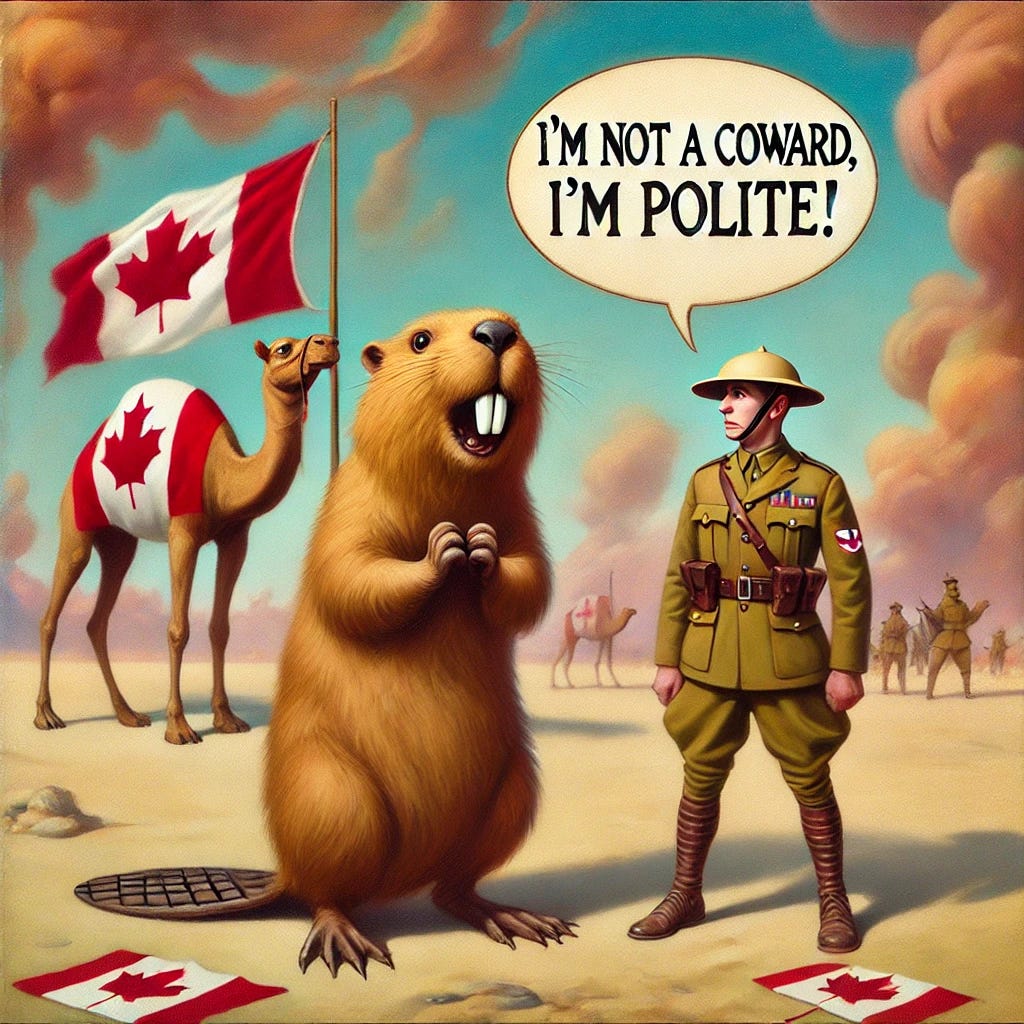Sorry, Eh?
How Canada Perfected Cowardice and Called It Courtesy
If you believe in free speech—not the slogan, but the dangerous, untamed variety—then subscribe to support uncensored, heretical writing. Every paid subscription buys more time to write without asking permission from the sort of people who think “problematic” is an argument.
Please subscribe to receive at least three pieces /essays per week with open comments. It’s $6 per month, less than USD 4. And now take 50% off.
Everyone says, "Hey, it’s just a cup of coffee," but please choose my coffee when you come to the Substack counter. Cheers.
Written Sept. 27, 2024, revised July 29, 2025
At last week’s protest against antisemitism, the turnout was a marvel of Canadian solidarity: a handful of Jews… and me — the lone Gentile.
The rest of the country was presumably busy polishing their consciences and curating pastel outrage on Instagram. This is our national reflex — observe persecution politely, nod gravely, and retreat to brunch. We mistake cowardice for courtesy and call it virtue.
Canadian “niceness” is the export brand: apologetic, deferential, forever chirping sorry. But beneath the maple varnish lies embalmed cowardice — self‑preservation lacquered in syrup. Scratch the surface and you won’t find compassion; you’ll find the terror of confrontation, the desperate fear of rocking even the smallest canoe.
And this famed passivity? It’s theatre. Canadians aren’t calm; they’re bottled up and clenching their jaws so hard you can hear molars crack. Politeness is not a peaceable virtue but cowardice in drag — repression with a grin. And repression always leaks.
The passive‑aggressive Canadian eventually snaps: hockey fans torch downtown Vancouver over a lost Stanley Cup, convoy truckers paralyse Ottawa for weeks in a honking tantrum, neighbours who mutter “no worries” about your barking dog for ten years suddenly heave the barbecue through your window.
Our outbursts aren’t principled revolutions; they’re tantrums born of decades of swallowing grievances in the name of “being nice.”
Workplaces reek of this pathology. Criticism is whispered, never stated. “Your report didn’t quite land” is code for “You’ve torpedoed the project.” Failure is rebranded as a “learning opportunity.” Teams implode while everyone smiles, passes muffins, and seethes silently until HR gets a 2 a.m. email about “toxicity.”
Meanwhile, our productivity spirals downward. Canada limps along at one per cent growth — half the pace of our brash southern cousins. Once ninth in global GDP per capita, we’ve slouched to nineteenth, sliding down the rankings as though manners were an economic strategy. We apologise.
And in universities — those supposed citadels of argument — the rot is complete. Lecture halls once designed for disputation now double as padded cells for fragile feelings.
Professors speak in pre‑emptive apologies; students are trained not to question but to detect microaggressions. “Safe space”, once meant freedom from violence; now it means freedom from discomfort — a kindergarten principle smuggled into higher education and treated as profound.
The absurdity follows inevitably: call Hamas “Nazis” and you’re exiled; praise Hamas and you’re promoted. Facts don’t matter; fashion does.
Hurt feelings are sacred; hurt truths expendable. Human Rights offices — Canada’s pastel inquisitions — enforce this creed with bureaucratic zeal: Torquemada in cardigans, wielding PowerPoint slides instead of racks and pincers.
This counterfeit politeness infects everything. Land acknowledgements? We’ve mastered the performance. Land back? Don’t be absurd. We weep on cue, issue ceremonial apologies, and return to inaction. We are virtuosos of symbolism — immaculate in gesture, paralysed in deed.
The same cowardice governs our global posture. Canada, the so‑called “middle power,” is forever in the middle — neither leading nor resisting, simply shrugging politely. We keep the peace not from conviction but because we’ve no appetite for conflict. Our foreign policy is one long apology, rendered bilingually.
The cure is not more etiquette but less. Not vulgarity for its own sake, but moral courage unafraid to bruise egos. Growth demands discomfort; truth requires offence. A nation that never offends is a nation that never stands for anything.
Neil Macdonald was right: Canadian politeness is self‑protection, not kindness.
And self‑protection at all costs leads inevitably to moral abdication whenever principle proves inconvenient. Until we stop mistaking silence for virtue and rediscover confrontation as a civic duty, we will keep mistaking meekness for morality while our institutions rot into therapy centres.
I write this as someone exiled for speaking plainly. In Canada, honesty is now a capital crime and politeness the state religion. We apologise to the lynch mob for staining their boots with our blood, climb the gallows ourselves, and leave a thank‑you note on the way down.







This is my cure for brutal insommia.